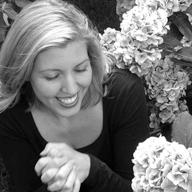Kelli Agodon

Kelli Russell Agodon is the author of two books of poems: Small Knots and the chapbook Geography. Her work has been published in the Atlantic Monthly, Prairie Schooner, Notre Dame Review, North American Review, Crab Orchard Review and Image. Her work has been featured on NPR's The Writer's Almanac with Garrison Keillor and in Keillor's second anthology, Good Poems for Hard Times. Born and educated in the Pacific Northwest, Kelli is a graduate of the University of Washington and Pacific Lutheran University's Rainier Writers Program where she received her MFA. Currently, she edits the literary journal Crab Creek Review.
Hike to God's Point
It's not summer, but autumn
running its bony fingers up my legs.
And the leaves falling on my hair?
A blessed-be crown for the pagan goddess
I didn't want to become.
Today, I would much rather be indoors
shopping at Saks for a long wool dress,
Donna Karan tights in forest green.
But nature has played its spirituality card
and I slip beneath maple trees,
sort out litter from leaves.
Sparrows sing, while I consider shades
of blush: Shallow Pink, Red Doubt,
Anxiety in Champagne Pink.
Sometimes I want not just happiness,
but the light blue box it arrived in
—Bleeding Heart nailpolish,
diamond rosary wrapped around
my cellphone—and I'm connected
without sacrifice, I view the field
without having to get my feet wet
in the dew-filled wildflowers below.
But where is my life?
I wander through it in new leather boots,
crushing the ladyslippers in my path.
When I come to a black bear munching
on berries to fatten up for winter, I pause.
We see each other
like two shoppers at the same sale rack,
each rummaging through, trying to find
what we think we need to fill us up.
From the Handbook for Emergency Situations
When we were in love
I read you How to Survive
If You Fall Through the Ice.
You were determined not to
listen. You plugged your ears when I read,
Face the direction from which you came.
You told me love could be confused
with drowning. I said, Use your elbows
to lift yourself onto the edge of the hole.
You never wanted to live
that coldly. You moved close, drank
peppermint tea. I read, Reach out
onto the solid ice as far as possible.
You said our chances were slim,
we lived in a temperate climate.
What if you knew then
that later we'd find reasons to dislike
each other's sentences, how many times
I'd look away when you wanted most
to meet my glance? What if we knew
the instructions—Kick your feet
as though you were swimming and pull yourself up
—could be useful when we were breaking up?
Or later, when we tried to reunite
how we should have listened—
Once on the icy surface, stay flat,
roll away from the hole.
New Telescope
I may never be happy, but tonight I am content.
Sylvia Plath
She turned knobs all evening.
Still the telescope remained
unfocused on the powder
of a satellite, a blur:
a moon, a moth.
Open maps of craters
papered the earth.
Bats looped from treetop
to treetop. She focused
full—attention—what was that?
A gunshot? Imagine,
someone's last sight—a clear night
and the halo of the moon. Or not.
A car backfired and a new galaxy
created from its exhaust. Clouds
appeared like curtains.
She aimed the scope at a star
with a name like Cancer or Columba,
or maybe she caught a plane
settling in the distance.
Her elbow slammed the tripod
and the telescope rocked,
reconnected with the earth.
Gravity-loving, sturdy little thing.
Through the eyepiece she peered
towards what she believed was Bliss
or Dove, jagged craters
sharpening one after another.

